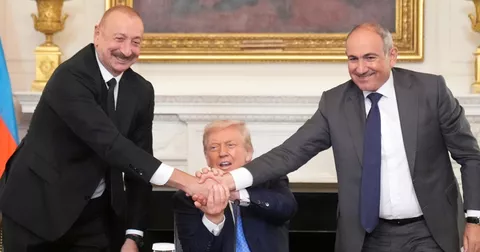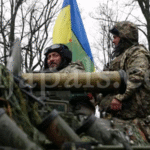Leaders of Armenia and Azerbaijan Shake Hands and Sign Historic Peace Deal at White House Summit

In a landmark event aimed at resolving decades of conflict, the leaders of Armenia and Azerbaijan came together at the White House on Friday to sign a peace agreement brokered by the United States. Azerbaijani President Ilham Aliyev and Armenian Prime Minister Nikol Pashinyan shook hands in a symbolic gesture of reconciliation, flanked by then-President Donald Trump, who actively participated in the handshake, underscoring the U.S.’s pivotal role in facilitating the breakthrough.
The agreement, hailed as a significant milestone by both leaders, focuses on reopening critical transportation routes that have long been obstructed due to the protracted conflict over the Nagorno-Karabakh region. A key component of the deal is the establishment of a transit corridor named the “Trump Route for International Peace and Prosperity,” which will connect Azerbaijan with its Nakhchivan exclave by traversing a 32-kilometer stretch of Armenian territory. This corridor promises to enhance regional connectivity, providing Azerbaijan—a major oil and gas producer—with direct access to Turkey and onward to Europe, thus unlocking substantial economic potential.
“Beat the Pressure: A Comprehensive Guide to Lowering Blood Pressure Naturally.”
Buy book from Gumroad or Paystack
President Trump expressed pride in having the corridor named after him, acknowledging the honor while noting that the suggestion originated from the Armenian side. This event adds to Trump’s portfolio of peace initiatives, reinforcing his self-styled image as a peacemaker and his aspirations for the Nobel Peace Prize. Both Aliyev and Pashinyan credited Trump’s administration for making the unprecedented progress, with Pashinyan emphasizing the foundation being laid for a more hopeful future and Aliyev describing the outcome as a “miracle” achieved within six months.
The deal signals a geopolitical shift in the South Caucasus. Historically, Russia has been the dominant power broker in the region, mediating conflicts to maintain its influence. However, Russia’s focus on its military campaign in Ukraine has diminished its capacity to control developments in Armenia and Azerbaijan. The U.S. has seized this opportunity to expand its presence and influence, as evidenced by the comprehensive agreements signed alongside the peace treaty, which include cooperation on energy, technology, and economic initiatives.
Negotiations for the development of the Trump Route—envisioned to include rail lines, pipelines for oil and gas, and fiber optic infrastructure—are set to commence shortly, with multiple developers already expressing interest. The route is expected to be a transformative regional artery fostering economic integration and improved diplomatic relations.
The conflict between Armenia and Azerbaijan over Nagorno-Karabakh has spanned nearly four decades, characterized by violent clashes and failed peace attempts. The region, while internationally recognized as part of Azerbaijan, has an ethnic Armenian majority and has been a flashpoint for armed conflict since the dissolution of the Soviet Union. The 2023 Azerbaijani offensive reclaimed all of Karabakh, setting the stage for renewed negotiations and the current agreement.
Azerbaijan’s insistence on a land corridor to Nakhchivan had previously stalled peace talks, with Armenia wary of sovereignty issues and external control. The new peace framework, fostered by U.S. mediation and the promise of enhanced regional cooperation, has helped overcome these obstacles, reflecting a broader realignment as Armenia seeks to reduce Russian influence and engage more closely with Western powers.
This historic handshake and the subsequent signing of the peace deal at the White House represent a hopeful turning point for a region long mired in conflict. The agreements not only aim to resolve territorial disputes but also to pave the way for economic development and regional stability, with the United States playing a central role in shaping the future of the South Caucasus.
💔 “She said she loved me. And for fifty-two years, I believed her.” 💔
Buy The Book "The Longest Lie: A Husband’s Journey Through Love, Betrayal, and Redemption" From Gumroad






